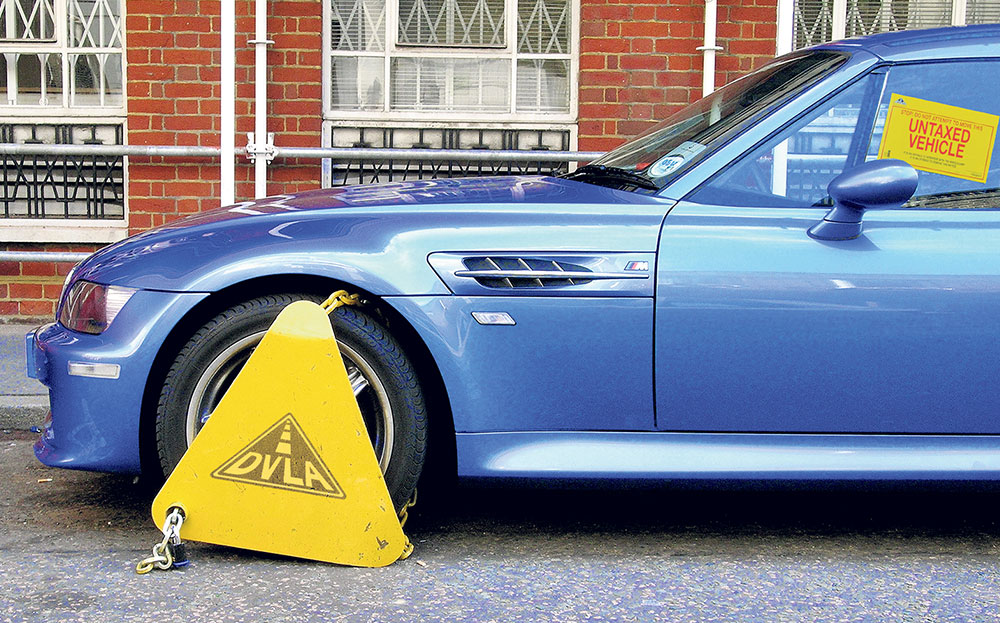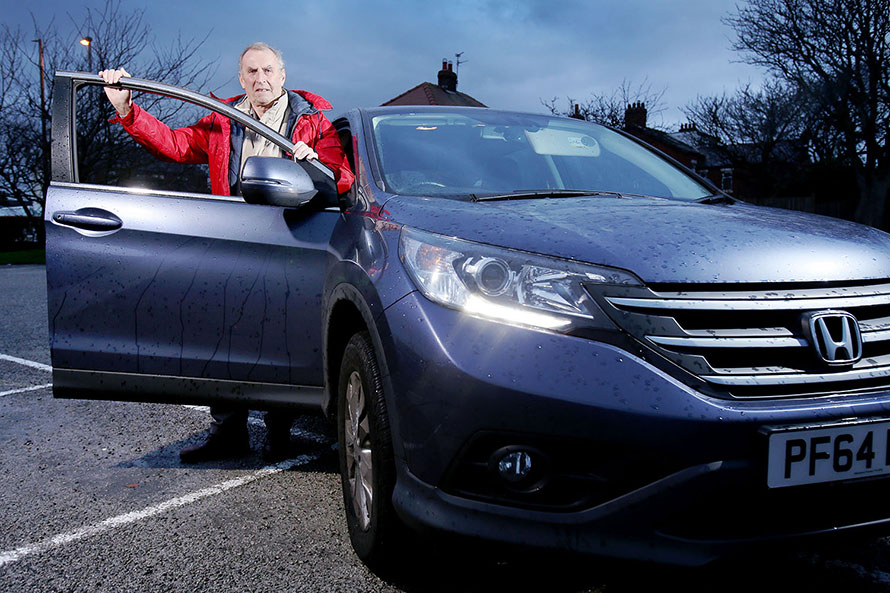Why the DVLA is clamping innocent motorists
Clamped – because the blundering DVLA said it wasn’t taxed

HOW’S THIS for an early Christmas present, courtesy of the DVLA: a wheel clamp, stranding you miles from home in the rain, and a £350 bill to get your car back?
Browse NEW or USED cars for sale on driving.co.uk
That’s what Brendan Webster, a retired solicitor from Blackpool, and his wife, Anna, received on Christmas Eve when they returned to their car after doing some last-minute shopping in Bristol.
“The notice on the windscreen said the car was untaxed,” says Webster, 72, who was visiting his daughter over the holiday. “And I thought, ‘No, that can’t be the case, because I taxed it for 12 months on the day that I bought it, September 15 last year.’ ”
To make matters worse, the only documentation to prove Webster was telling the truth was at his home — 200 miles away. “That’s not a situation you want to be in, believe me, particularly when it’s dark and drizzling and everything is closed for Christmas.
“We were embarrassed and annoyed, but luckily we were only a mile and a half from my daughter’s house, so we walked back. For someone in a different situation, it could have been nigh-on catastrophic.”
A problem arises if the seller is late in notifying the agency of the change of ownership. The consequences are severe and unforgiving for motorists
The Websters’ unwelcome gift has exposed a gaping flaw in the multimillion-pound computer system used by the Driver and Vehicle Licensing Agency (DVLA) to administer vehicle tax. The automated system replaced the old paper tax disc in 2014 and relies on a database, which can be checked remotely by police and enforcement officers to flag up any cars without road tax.
Under the old system the car’s tax status could be checked simply by looking at the paper disc stuck to the inside of the windscreen. The problem is that the DVLA’s computer appears to be getting confused about car ownership — a glitch that has resulted in drivers being wrongly clamped. The system may show they are untaxed even if they — like Webster — have taxed their car.
Previously, when you bought a new or used car, any unused tax came with it, so you didn’t need to retax it until the disc had expired. Under the new system, vehicle tax is automatically cancelled when a car changes ownership, and the seller is refunded any remaining tax.
New owners must tax the car as soon as they take hold of the keys. The person or dealer selling the vehicle must inform the DVLA of the change of ownership “as soon as possible”, and the agency’s computer is then supposed to match the car with the tax taken out by its new owner.
A problem arises if the seller is late in notifying the agency of the change of ownership. The consequences are severe and unforgiving for motorists, who are being clamped without justification.

This is what happened to Webster, and it resulted in a Kafkaesque battle with the authorities. “I called the DVLA and was told that the computer showed that the car was not taxed, so even if I had the paperwork with me, it would have been worthless,” says Webster.
“They said I would have to call the clamping pound, but that was closed over Christmas, so there was nothing I could do. Throughout the weekend, in the back of my mind, I was thinking, ‘How the blazes could this happen?’
“When I bought my car, the Honda dealer taxed it for me: I watched him do it with my credit card. There was a printout dated September 15 from the government vehicle tax website, which gives the application reference and thanks me for the payment of £205.
“But when I checked . . . the DVLA website confirmed that, lo and behold, the car was not taxed. It ran out on September 2. How do you argue with a computer?
“You either become Basil Fawlty and start flaying your car with a branch or you pay the extra money. So I decided to tax the car again. Luckily I was in a position to pay another £205; thousands would not be.”
Once the clamping pound reopened on December 27, Webster called to get his car released. He was made to pay £100 on top of the additional tax. “I just couldn’t understand what had happened,” he says.
Webster contacted The Sunday Times and we approached the DVLA, which admitted it had been at fault. It said that although Webster had taxed the car on September 15, it had not received notification from the Honda dealer confirming the sale and change of ownership until November, at which point its computer automatically cancelled the tax that Webster had paid in September. The tax should have been automatically refunded to Webster, but he did not receive it.
“While the DVLA does consider mitigating circumstances, it generally acts as judge, jury and sentencing body”
“We have contacted the customer directly to apologise,” the agency said. “These cases are rare among the 47m transactions we process each year. What happened was that we received the disposal slip late from the dealer and the tax was then cancelled. Our advice would be that when you are selling or disposing of a vehicle, you need to tell us promptly.”
It said it would refund the £100 Webster had to pay to get his car released and that it was making changes to try to prevent such mix-ups.
Blackpool Honda, where Webster bought the car, says it always informs the DVLA of changes of ownership in good time.
Since the tax disc was abolished, there have been concerns that the new electronic record system may be flawed. The DVLA admitted last year that since the abolition the number of cars clamped each month had risen from about 5,000 to more than 8,000. Without a windscreen disc to remind them, many drivers appear to forget to pay the duty.
The proportion of cars being driven untaxed has leapt from 0.6% two years ago to 1.4%, according to an official government roadside survey that is conducted every two years at 256 locations around the country. That equates to more than 500,000 vehicles without valid tax.
The government estimates that £80m a year is now being lost through unpaid tax — £45m more than two years ago. The loss is far higher than the £7m of annual administrative savings it said it would make by abolishing the paper disc.
Critics also point out that clamping for the DVLA is carried out by a private company. Police have access to the agency’s database showing which cars are taxed and which are not, as does a company called NSL, formerly part of the NCP car parks group. In 2013 it won a contract to clamp vehicles for the DVLA until November this year.
NSL has vans equipped with automatic numberplate recognition cameras linked to the database. When the cameras spot the numberplate of a car the database says is not taxed, the clampers get to work. They are exempt from the ban on clamping cars on private land, introduced with the Protection of Freedoms Act in 2012, because they are operating on behalf of the DVLA, a government agency.
“Abolition of the tax disc has certainly placed a huge burden and responsibility on the DVLA and its database,” says Paul Watters of the AA. “The problem is that while the DVLA does consider mitigating circumstances, it generally acts as judge, jury and sentencing body. There needs to be a better appeals process, particularly in relation to handling technological or human errors on the part of the agency or customer.”
Webster says he is pleased he pursued the DVLA. “I’ve seen this type of behaviour before,” he says. “When I was working as a solicitor I dealt with a lot of extortion cases.”
Browse NEW or USED cars for sale on driving.co.uk




